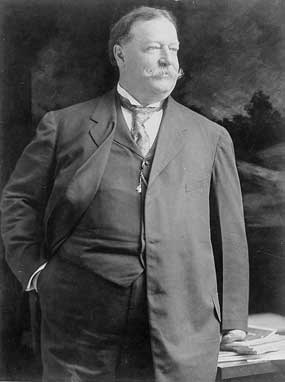William Taft

Taft was Roosevelt's chosen successor. He believed in a more liberal form of Presidential power than that of his predecessor. This partially explains why Taft was constantly caught in a struggle between the progressives and the conservatives.Elected 1908
The Early Years
William Howard Taft was born in Cincinnati, Ohio. Taft had an active childhood and he was an avid baseball player. Taft was educated in the public schools of Cincinnati for elementary and high school. He went on to attend Yale University, were he graduated second in the class of 1878. Upon graduation, Taft returned to Cincinnati were he attended law school. He was admitted to the bar in 1880.
Taft's first job upon completion of law school was Assistant Prosecutor of Hamilton County. In 1887, Taft was appointed Judge on the Cincinnati Superior Court. Taft served as U.S. Solicitor General from 1890 to 1892 and then as Judge on the U.S. Sixth Circuit Court. From 1896 to 1900, Taft was also a professor of law and then dean of the Cincinnati Law School.
In 1900, Taft was appointed Commissioner of the Philippines. It was his job to insure the establishment of civil administration in the Philippines, which the United States had just acquired in the Spanish-American War. From 1901 to 1904, Taft served as the Governor General of the Philippines. From 1904 to 1908, Taft was Secretary of War in the Roosevelt administration.
Accomplishments in Office
Following Roosevelt's presidency, Taft assumed the role of President. While he largely agreed with the policies of the previous administration, Taft believed that the Presidency had been overly empowered. His approach was notably less assertive, a shift that was viewed as a departure from Roosevelt's progressive principles, leading to a significant division within the Republican party.
Taft was committed to lowering tariffs, and when elected, he called Congress into a special session to this end. Congress succeeded in reducing the average tariff from 46 to 41 percent. However, special interest groups managed to raise the tariff on several items. Taft was an avid enforcer of the anti-trust policies of the Roosevelt administration. He repeatedly instituted the number of anti-trust suits brought against monopolist corporations. During his term of office, two of the biggest monopolies were broken - Standard Oil Company and the American Tobacco Company. Under Taft, the federal government for the first time began the regulation of the telephone and telegraph industries. The government also obtained the authority to fix interstate commerce rates.
Taft's foreign policy was characterized by his proactive approach. He was the driving force behind the Dollar Diplomacy, a strategy that used the US military to advance American business interests globally. Taft defended this policy as an extension of the Monroe Doctrine. Additionally, he was a strong advocate for arbitration as the preferred method for resolving international disputes.
After his defeat in the 1912 election, Taft went on to become the Chief Justice of the Supreme Court, a position he found more satisfying than the Presidency.
The First Family
Father: Alphonso Taft
Mother: Louisa Maria Torrey
Wife: Helen Herron
Daughter: Helen
Sons: Robert Alphonso, Charles Phelps
Major Events
Robert Perry Arrives At North Pole
Dollar Diplomacy
NAACP Founded
Triangle Fire
Standard Oil Broken
Marines Intervene In Nicaragua
Lodge Corollary
The Cabinet
Secretary of State: Philander Knox
Secretary of the Treasury: Franklin MacVeagh
Secretaries of War: Jacob Dickinson, Henry Stimson
Attorney General: George Wickersham
Secretary of Navy: George von Meyers
Postmaster General: Frank Hitchcock
Secretaries of the Interior: Richard Ballinger, Walter Fisher
Secretary of Agriculture: James Wilson
Secretary of Commerce and Labor: Charles Nagel
Military
US intervened in Nicaragua
US intervened in the Dominican Republic
Did You Know?
First President to become Chief Justice of the Supreme Court.
First cabinet member (other than Secretary of State) to become president.
First President to open a baseball season.
